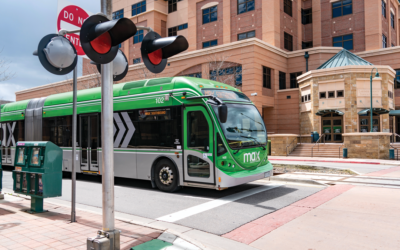Courtney Miller first noticed something was off while on her honeymoon. She’d seen a little bit of blood in her stool. That wasn’t exactly something she wanted to focus on at the time, so she set it aside.
But then it happened again the next month. And the next. By month three, she decided to call the doctor. She had, of course, Googled her symptoms, but she’d managed to convince herself it wasn’t the worst-case scenario.
After a colonoscopy and several days of waiting, she got a phone call from her doctor.
“That’s a phone call you never forget,” Miller says. “He said, ‘We got your test results, and you do have cancer.’”
Miller, 31, of Fort Collins, was diagnosed with rectal cancer. As a young, otherwise healthy person, she was shocked.
And yet, doctors have diagnosed cancer in a steadily increasing number of young people across the globe since the ’90s, according to a study published in BMJ Oncology, especially in more developed countries.
Scientists don’t yet know what’s behind the rise. Researchers have investigated potential culprits, including an increase in early screenings and better detection, rising obesity rates, consumption of ultra-processed foods, alcohol consumption and more, but they have not found an answer that fully accounts for the increase, according to an article published in the journal Nature.
So, what can you do to protect yourself and your loved ones? That’s where screening comes in.

Courtney Miller and her husband, Graham, on top of Mount Princeton as part of FightCRC’s Climb for a Cure fundraiser last year.
Cancer screenings
Screening for specific cancers, such as colorectal, breast and lung cancer, is especially important, as all three types are increasingly diagnosed in young people and have been shown to have both the highest mortality rates and the biggest impact on quality of life for survivors, according to the journal BMJ Oncology.
Meg Vertovec, a nurse practitioner with the Larimer County Department of Health and Environment, says she has seen screening recommendations change during her career to reflect the change in young people.
“Previously, the recommendation for colorectal cancer screening was to start at age 50, but that recommendation has changed to start at age 45,” she says. “That is quite the shift based on increasing rates in younger folks that we were missing by starting later.”
Breast cancer screening recommendations have changed too, shifting from starting at age 50 to age 40.
If someone has a close relative, such as a parent or sibling, who was diagnosed prior to those ages, Vertovec says it’s recommended that they get screened 10 years before their first-degree relative was diagnosed.
“If someone has a mom who was diagnosed with breast cancer at age 40, often the recommendation would be to begin at age 30 for that person,” she says.
There’s also an important difference between screening and diagnostic testing, she says.
Screening is when a patient doesn’t have any symptoms; their healthcare provider screens them because of their age or certain risk factors. The idea is to catch cancer before it causes noticeable symptoms. Diagnostic testing is when someone comes in with a concern, Vertovec says, whether it’s a breast lump, pain or rectal bleeding, such as the appointment Miller made with her doctor.
Self-exams and at-home testing
Women of all ages are encouraged to perform a breast self-exam once a month. According to the National Breast Cancer Center, women who are still menstruating should do an exam a few days after their period ends. For post-menopausal women, the center recommends doing an exam the same day of each month. These exams help women become familiar with the way their breasts normally look and feel. If you notice any abnormalities, such as a new lump or skin changes, the center recommends reporting them to your doctor right away.
There are several at-home stool tests people can use to screen for colorectal cancer as well. The U.S. Preventative Services Task Force recommends that most folks begin screening at age 45 under the guidance of their doctor.
Some cancers, such as lung cancer, are more difficult to screen for at home. However, folks experiencing shame or stigma, especially for smoking cigarettes, do have one option. The only at-home lung cancer screening test is called a multi-cancer early detection test. Still, scientists generally agree that more research needs to be done to better understand the reliability of these tests. In most cases, it’s best to consult your primary care physician.
“A lot of younger people don’t have a primary care provider because they feel good,” Vertovec says. “Those are important people to reach because, whether it’s because of their family history or their age, they might qualify for certain screening despite feeling really well.”
When Miller was diagnosed, she didn’t have a family history of rectal cancer. She was still more than a decade away from being recommended for screening. Because of the bleeding, her doctors encouraged her to get a colonoscopy, even when she didn’t think she needed it. That’s how they caught the cancer early. Miller says she’s come across other young adults who weren’t diagnosed until the cancer had progressed to later stages.
“Not enough doctors are aware of this in young adults,” Miller says. “I feel grateful mine pushed me to get a colonoscopy. I even went back and thanked them.”
So, why not screen people even younger?
There’s a fine line to walk with screening early enough to catch cancer but not so early that it puts people through unnecessary procedures that can be painful, costly and stressful, Vertovec says.
“Medicine isn’t perfect, so there is a risk, such as false positives, that can lead to anxiety and interventions that weren’t necessary,” she says. “That can lead to costs for patients, especially if they aren’t covered by their insurance. That can be a huge burden.”
Miller is about to turn 34, and she’s two years out from her last chemotherapy treatment. Her doctors were able to shrink the tumor down to a scar.
She says it kills her a little inside when people bash colonoscopies or say they won’t get them. That used to be her, she says, but now she’s seen the devastation cancer can bring. There are worse things than a bit of discomfort.
“I wish people would take action if they think something is going on,” she says. “Please don’t hesitate. Please get screened.”
___________________________________________________________________________________
Cancer Prevention
Scientists don’t know what’s behind the rise in new cancer cases, but the best ways to prevent cancer remain the same. According to the American Cancer Society, these are the best ways to reduce your risk of cancer:
• Avoid tobacco
• Maintain a healthy weight
• Stay active
• Eat a healthy diet, including fruits and vegetables
• Avoid or reduce alcohol
• Protect your skin from the sun
• Know your family history and personal risk
• Get regular check-ups and cancer screenings
___________________________________________________________________________________
Cancer Screening Guidelines*
Colon and rectal cancer (and polyps)
• For most people, it’s recommended to get regular screenings between ages 45 and 75. People between ages 76 and 85 should talk with their doctor about what’s best for them.
Breast cancer
• At age 40, women should begin annual mammograms, according to the U.S. Preventive Service Task Force (USPSTF).
• Women ages 55 and older should at least get mammograms every two years, according to the American Cancer Society.
• All women should know how their breasts normally look and feel. If something changes, tell your doctor right away.
Cervical cancer
• Screening should begin at age 25, according to the American Cancer Society. The USPSTF recommends
beginning screening at age 21.
• People between the ages of 25 and 65 should get a primary human papillomavirus (HPV) test done every five years.
• People over age 65 should not be tested for cervical cancer if they’ve had normal results over the past 10 years or are not otherwise considered high risk.
• People who have received the HPV vaccine should follow screening recommendations for their age group.
Endometrial cancer
• By the time of menopause, the American Cancer Society recommends that all women know about the risks and symptoms of endometrial cancer. Women experiencing unexpected vaginal bleeding or spotting should tell their doctors.
Lung cancer
• People ages 50-80 who smoke or used to smoke and have at least a 20 pack-year history of smoking should talk to their doctor about yearly screenings for lung cancer with a low-dose CT (LDCT) scan.
• The USPSTF states that screening can be discontinued if a person hasn’t smoked for 15 years.
• A pack-year, according to the American Cancer Society, is equal to smoking one pack, or about 20 cigarettes, per day for a year.
Prostate cancer
• Starting at age 50, men should talk to their doctor about the pros and cons of testing to decide whether testing is right for them, according to the American Cancer Society.
• Those at a higher risk, including African American men and those who have a father or brother who had prostate cancer before age 65, should talk with their doctor at age 45.
• The USPSTF recommends against screening men 70 years and older.







